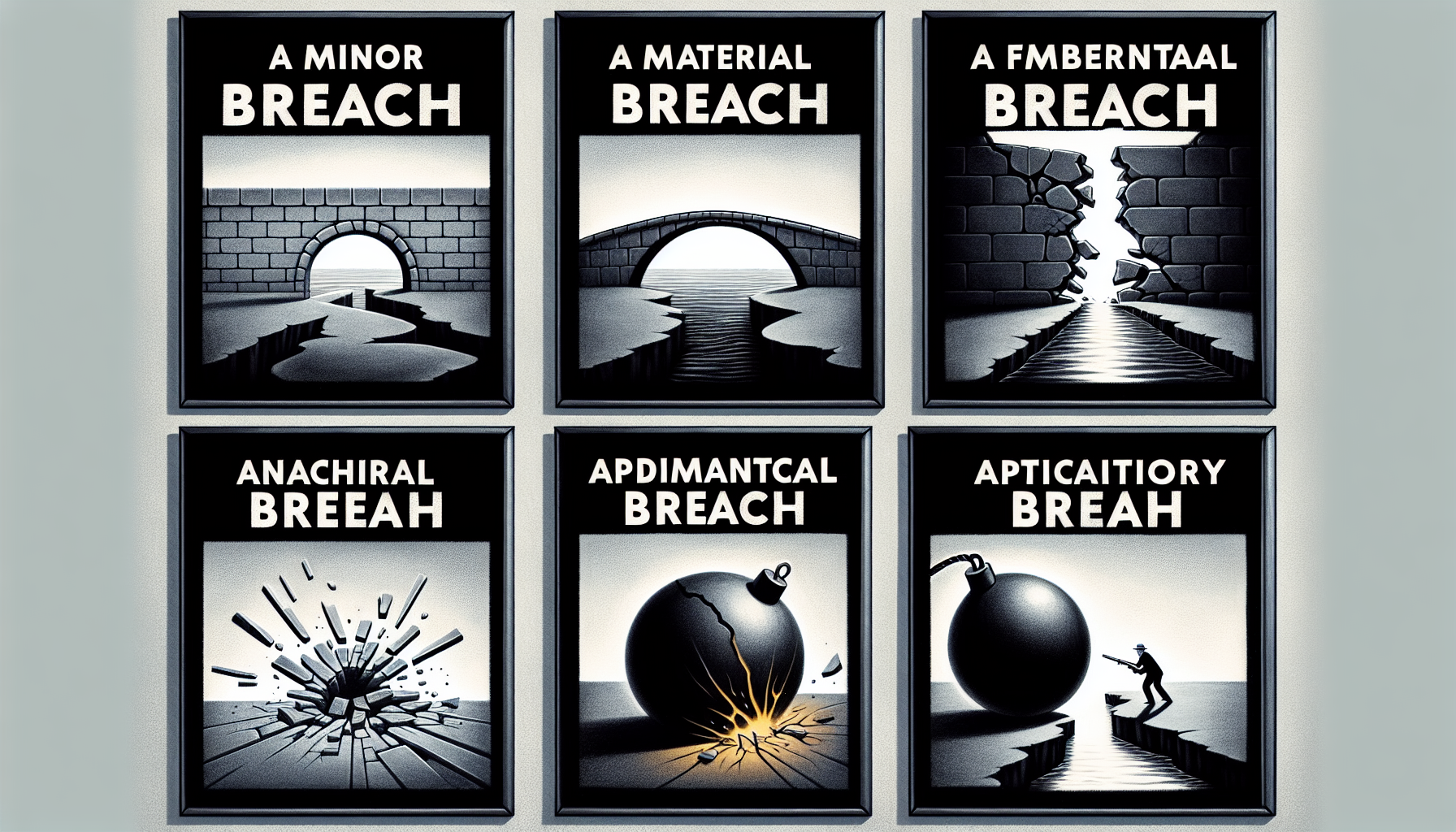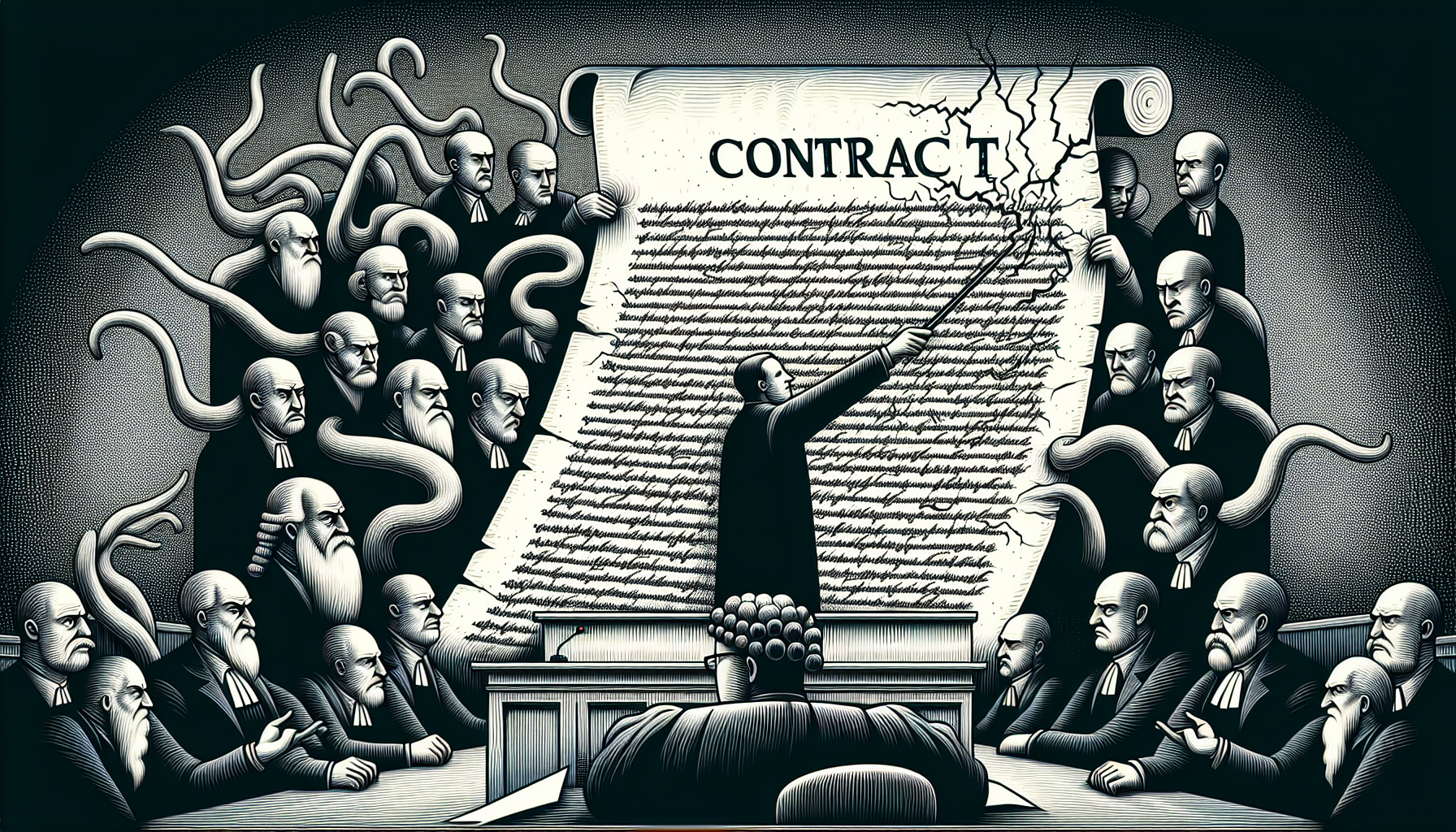Malcolm ZoppiWed May 08 2024
Navigating Your Breach of Contract Claim: A Step-by-Step Guide
When a party fails to uphold their end of a contract, you may be faced with filing a breach of contract claim. Understanding what qualifies as a breach, how to prove it, and what remedies are available to you, are crucial first steps towards enforcement or compensation. This article provides a step-by-step guide on effectively […]
When a party fails to uphold their end of a contract, you may be faced with filing a breach of contract claim. Understanding what qualifies as a breach, how to prove it, and what remedies are available to you, are crucial first steps towards enforcement or compensation. This article provides a step-by-step guide on effectively managing the complexities of breach of contract claims, from identification to legal resolution.
Key Takeaways
A breach of contract occurs when a party fails to fulfill their obligations, which can result in legal actions such as negotiations, settlements, or litigation to rectify the situation.
Breach of contract claims are based on the existence of a legally binding contract, classified by severity into minor, material, fundamental, or anticipatory breaches, each having specific implications and remedies.
Proving a breach of contract involves confirming the contract’s validity, demonstrating the breach and associated losses, with legal remedies including compensatory damages, equitable remedies, or termination of the contract.
Understanding Breach of Contract Claims

Commerce thrives on contracts, which provide assurance and trust that enable seamless deals. When a breach of contract happens, it means that one party has not lived up to their commitments or specific terms laid out in the agreement. The offending party may face legal action and be responsible for damages due to this failure. Such breaches are serious issues requiring resolution methods designed to amend the unfulfilled promises—this can range from negotiations to settlements or even court proceedings aimed at rectifying the issue.
Before pursuing any course of action, identifying and understanding the nature of the contract breach is essential. This requires an analysis of evidence showing obligations left unmet, services rendered incompletely, or those failing to meet agreed-upon standards within the scope of the contract.
Identifying a Breach of Contract
A breach of contract occurs in various scenarios, such as when there is:
An utter non-performance
Delivery that is either incomplete or substandard
Incapacity to perform obligations flawlessly
Anticipatory breaches, evident beforehand when one party clearly indicates an inability to uphold their contractual duties—for instance, if a logistics firm intimates they will fail to adhere to a stipulated delivery timetable.
Proof of a contract breach may manifest through unfulfilled responsibilities, performance that falls short of completion, or work executed below the quality benchmarks set forth by the terms of the contract.
Legal Basis for Breach of Contract Claims
A legally binding contract serves as the crucial foundation for any breach of contract claims. To be recognized as a valid contract, it is essential that there are specific elements present.
An offer
Acceptance of this offer
Consideration or something of value being exchanged
A mutual intent to create legal relations between parties
These components play an integral role in establishing a legal agreement which, when followed by clear definitions of each party’s duties and responsibilities within the contract, ensures its enforceability. For certain contracts to attain legality, they must also be put into written form and signed by all involved individuals.
Breaching such an agreement does not usually constitute a criminal act. Exceptions can occur, particularly if fraudulent actions are intertwined with the breach.
Types of Breaches and Their Implications

Understanding the category of contract breach is crucial because each type comes with its own set of implications and potential repercussions. Breaks are differentiated into:
Minor
Material
Fundamental
Anticipatory
These classifications highlight the unique nature, ranging from how serious a breach is to what effect it could have on the contractual agreement.
Minor Breaches
Even a minor breach can lead to complications. It represents a situation where an aspect of the contract is not adhered to, but this deviation is so small that it doesn’t prevent the overall fulfillment of the contractual obligations. For instance, repeated delays in payment processing or materials delivered past their due date could result in a slight setback in production without bringing it to a complete stop.
While such breaches don’t render the agreement obsolete, they may still warrant restitution for any incurred damages sustained by the non-breaching party. Typically these smaller infractions do not give rise to sufficient grounds for said party—the injured one—to dissolve the contract altogether.
Material Breaches
Contract violations that are considered material breaches gravely disrupt the fundamental benefits envisioned within the contract, frequently undermining the central provisions of the agreement. For instance, delivering a product or service with substantial defects to such an extent that it becomes non-functional and leads to considerable losses represents a material breach.
A breach of this magnitude in a contract could result in either financial restitution for damages incurred or dissolution of the contractual relationship itself.
Fundamental Breaches
When a contract experiences a fundamental breach, it strikes at the core of the agreement. This severe form of violation significantly robs the innocent party of their expected benefits under the contract. Such a breach grants the non-breaching party the right to end the agreement and seek compensation through legal action.
Anticipatory Breaches
An anticipatory breach arises when a party signals ahead of time their intention not to meet future obligations, potentially leading to the termination of the contract and enabling claims for damages. Such a breach introduces instability and disrupts the non-breaching party’s ability to plan and carry out upcoming contractual duties.
When an anticipatory breach is detected, actions available to the non-breaching party include:
Opting to hold off action in order see if the breaching party will indeed fulfill their part
Canceling the contract while also pursuing compensation for damages caused bythe breach
Upholding the contract and demanding that all agreed-upon responsibilities are honored.
Proving a Breach of Contract Claim

Efficient handling of a breach of contract claim hinges on proving certain critical points. One must establish the presence of an enforceable agreement, pinpoint that a breach has indeed transpired, and show the damages incurred because of this violation. Typically, you have six years from when the infringement occurred to lodge a contract breach claim. If the accord was affirmed as a deed, this timeframe extends to twelve years.
Verifying such claims is nothing but simple. It encompasses tasks like seeking legal counsel, submitting essential court papers along with corresponding fees and rigorously compiling all pertinent evidence needed to strengthen your case.
In these situations it’s advantageous to seek out expertise from someone specialized in contractual law – for example at Gaffney Zoppi – who can assist considerably by managing negotiations professionally while also representing you legally or guiding through different mechanisms designed for resolving disputes amicably outside of court settings.
Establishing the Existence of a Contract
To prove a breach of contract claim, it’s essential first to demonstrate the presence of a legally binding agreement. This involves showing that the following key elements are met:
A clear offer
An acceptance of said offer
Consideration or value exchange
Mutual intention for legal enforceability
The capacity to enter into an agreement
Contracts may be formalized through different methods such as explicit agreements, implied contracts, oral understandings, and conduct-based relationships where no verbal or written communication is necessary. Having the terms laid out in writing can provide definitive proof of the parties’ commitment.
When forming a contract, there are underlying assumptions like both parties possessing the ability to agree legally and an inherent intent to form a binding relationship—assumptions which hold especially true in commercial contexts. Failure to comply with even unwritten stipulations or tacitly understood conditions can constitute grounds for claiming a breach.
Demonstrating the Breach
When a legally binding contract is in place, the focus shifts to proving any violations of that agreement. To do this, it’s necessary to present proof of non-fulfillment such as missed deadlines or performance shortfalls, among other possible contractual complications. The difficulty in confirming a breach rises substantially if the contract was drafted with poor clarity and ambiguous terms.
Considerable changes within an organization’s leadership or frequent employee turnover can be indicative of underlying instability. Such patterns often act as precursors to breaches in contracts by signaling turmoil at higher levels within one of the parties involved in the agreement.
Showing Loss or Damage
To establish a breach of contract claim conclusively, it is essential to prove the occurrence of loss or damage stemming from said breach. It must be shown that any losses sustained were seen as a predictable outcome at the time when the agreement was formed. Undergoing a contract dispute can be an ordeal fraught with significant emotional strain and economic expense for those who file such claims. They are expected to limit their potential losses by contemplating reasonable alternative solutions offered, like accepting substitute equipment from another supplier.
In seeking remuneration through damages due to a contractual violation, claimants have the right to include compensation for management time lost—a reflection of anticipated revenue not earned because employees had to divert attention away from their customary responsibilities in dealing with repercussions from this breach.
Legal Remedies and Damages

Should a contract breach be substantiated, the injured party has access to multiple legal remedies. Compensatory damages are among these measures, designed to restore the affected individual to a status equivalent to if the contract had been honored as agreed. In cases of breach of contract, any damages granted intend solely to address verifiable financial harm and do not extend compensation for emotional distress or turmoil.
Monetary Damages
In English law, the predominant remedy for a contract breach is monetary damages. Their purpose is to compensate for verifiable financial loss and aim to restore the claimant to a situation equivalent to what would have prevailed had the contract been executed as promised. This compensation can include reimbursements for expenses already made and remuneration for profits not realized.
Occasionally, when it’s possible for a breach of contract to be rectified by an alternative provider, cost of cure damages may be awarded. These are designed to bring about conditions that closely resemble those that would exist if there had been no issue in fulfilling the original agreement.
Equitable Remedies
In instances where a breach of contract has caused harm, monetary compensation might not always be sufficient redress. This is when equitable remedies like injunctions are considered to either mandate or restrict particular actions. Injunctions serve the purpose of averting additional damage or preserving the current state while awaiting a final decision. They are usually pursued in situations where conventional monetary damages fail to provide an adequate remedy for the breach.
The awarding of an injunction or specific performance seeks to deliver justice and equity beyond what financial reparation can achieve alone. These legal measures ensure that outcomes address scenarios where money cannot fully resolve the loss stemming from a contract violation.
Termination of Contract
Under specific conditions, when one party commits a significant breach of contract, the party that has not breached is entitled to end the contractual agreement. This termination of the contract serves as a corrective measure for the non-breaching party in response to substantial violations by their counterpart.
Within an employment scenario, examples of breaches that may justify such terminations are repeated delays in salary payments by employers or rescinding an accepted job offer.
Engaging a Contract Solicitor

Navigating the complexities involved in a claim for breach of contract can prove to be quite daunting. Engaging a contract solicitor from firms such as Gaffney Zoppi is beneficial, as they deliver customized legal advice that caters specifically to each individual case of contractual disagreement, guaranteeing that resolutions are uniquely suited to the needs of their clients.
They place high importance on addressing legal requirements swiftly, with services such as reviewing and composing contracts being completed expeditiously. They aim to react quickly, typically within a 24-hour period for telephonic inquiries and even more rapidly when communication occurs through email.
Benefits of Hiring a Contract Solicitor
Employing the services of a contract solicitor brings several benefits. This professional delivers bespoke legal advice tailored to individual contractual issues, guaranteeing solutions are customized to each client’s particular circumstances. They also make certain that contracts meet rigorous criteria, thereby reducing potential risks and fostering the expansion of businesses.
These solicitors place great importance on quickly addressing legal requirements, often returning phone calls within 24 hours and replying to emails in an even more expedited manner.
Gaffney Zoppi’s Expertise
With a strong focus on contract law, Gaffney Zoppi excels in developing customized legal strategies that encompass service contracts and intricate shareholder agreements. Their professional legal offerings cater to an extensive clientele comprising entrepreneurs, business proprietors, shareholders, board members, vendors of services, individuals in the private sector, non-profit organizations along with those invested in private equity.
They demonstrate adeptness in modern aspects of contract law by tackling pertinent legal concerns faced by UK enterprises engaging with artificial intelligence technologies.
Preventing Breach of Contract Claims
Despite the complexity involved in claims of breach of contract, there are specific tactics that can prevent these types of claims from arising in the first place. These strategies involve:
Adhering to promises made
Sustaining elevated standards of performance
Ensuring communication is transparent and clear
Conducting consistent oversight and evaluation
Including mechanisms for resolving disputes within the contract
Clear Communication and Documentation
Ensuring that all business communications, such as emails, the minutes from meetings, and any pertinent correspondence, are well documented is crucial for preventing miscommunications and contract violations. This thorough record-keeping provides transparent insight into the expectations and agreements of every party involved. It allows for early detection of signs that may hint at looming disputes — like disruptions in communication or delays in payment — giving you the opportunity to resolve these issues before they develop into significant disagreements.
Regular Review and Monitoring
Regularly examining and carefully overseeing contracts ensures that everyone involved is fulfilling their commitments and identifies opportunities for improvement. By vigilantly keeping track of when contracts are due for renewal or extension, monitoring can avert accidental expirations or unintended prolongation of agreements.
By measuring key performance indicators (KPIs) such as delivery timeframes, quality standards, and expense against the stipulations outlined in the contract, one can boost both the efficacy and results of said contract. In essence, diligent observation of contractual agreements fosters an atmosphere of respect and comprehension among parties concerned, which may lead to friendly resolutions should disagreements arise.
Dispute Resolution Mechanisms
Including dispute resolution provisions within a contract can lessen both the frequency and the consequences of disputes over contracts. To ensure that there is a systematic process for resolving issues, these clauses need to clearly define which laws apply and which jurisdiction will preside. Mediation—where an impartial third party assists—is often required before taking legal action on breach of contract claims, promoting the discovery of amicable resolutions.
Consulting with attorneys can assist in negotiating solutions that are acceptable to all parties involved while maintaining business relationships and avoiding the costs associated with going to court. Alternative methods like arbitration may also be used for resolving contract claims outside court proceedings. It’s prudent to seek legal advice when faced with such circumstances.
Summary
To sum up, grasping the nuances of breach of contract claims, recognizing various breach categories, and mastering claim substantiation are pivotal elements in the realm of contract law. Contract solicitors like those at Gaffney Zoppi offer indispensable support in unraveling these intricate issues to safeguard one’s legal entitlements fully. Leveraging their specialized know-how and customized legal strategies ensures that clients receive the necessary direction when confronted with such demanding circumstances.
Frequently Asked Questions
What is the expertise of Gaffney Zoppi contract lawyers?
Gaffney Zoppi’s contract attorneys specialize in crafting tailored legal strategies, encompassing everything from straightforward service contracts to complex shareholder agreements.
What do Gaffney Zoppi contract review lawyers do?
Contract review attorneys at Gaffney Zoppi maintain the most rigorous standards in document examination to minimize potential risks and foster the expansion of businesses.
Who does Gaffney Zoppi work with and advise?
Zoppi Gaffney provides guidance and services to a diverse clientele, encompassing business founders, proprietors of businesses, equity holders, board members, service suppliers, individual consumers, philanthropic organizations, and stakeholders in investment and private capital firms.
How does Gaffney Zoppi ensure that contracts are tailored to specific business needs?
By dedicating time to comprehend the unique objectives, challenges, and aspects of a client’s enterprise, Gaffney Zoppi guarantees that each contract is meticulously crafted to align with particular business necessities. This thorough approach ensures contracts are personalized to meet individual specifications effectively.
What is the turnaround time for getting a contract reviewed or drafted with Gaffney Zoppi?
Gaffney Zoppi ensures a swift turnaround in the review or drafting of contracts, emphasizing prompt fulfillment of legal requirements and quick responses to both calls and emails.